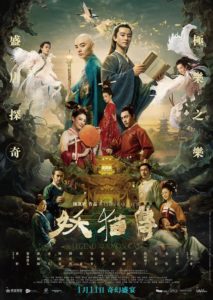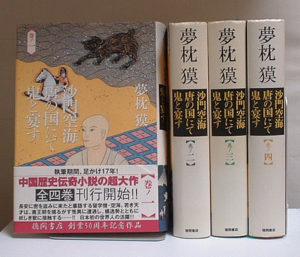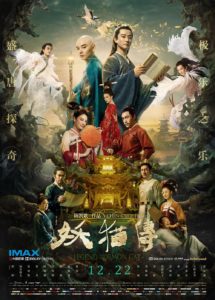Legend of the Demon Cat
妖猫传
China/Japan/Hong Hong, 2017, colour, 2.35:1, 128 mins.
Director: Chen Kaige 陈凯歌.
Rating: 7/10.
Stunningly mounted costume detective story-cum-revisionist history loses traction in the second half.
Chang’an [modern-day Xi’an], central China, Tang dynasty, AD 805. A demon black cat appears at the home of imperial guards captain Chen Yunqiao (Qin Hao) and his wife Chunqin (Zhang Yuqi) and says there’s a pile of money buried under a tree in the garden. On 25 Feb, as young Buddhist master Kukai (Sometani Shota) arrives from Japan for an audience with the emperor Dezong (Zhou Zhonghe), the latter dies from a sudden fit. Kukai senses the presence of a demon black cat. He later meets scholar Bai Letian (Huang Xuan), who’s been in the palace for three years working on a poem, The Song of Everlasting Sorrow 长恨歌, about the love of a previous Tang emperor, Xuanzong, for his chief concubine Yang Yuhuan. While discussing the  emperor’s strange death, Kukai shows Bai Letian some cat hair that he found on Dezong’s body and the latter says he’s heard that an imperial guards captain, Chen Yunqiao (Qin Hao), had a black cat at his home. While showing Kukai around Chang’an, the pair follow Chen Yunqiao to the famous Huyu Pavilion where the guards captain carouses with his colleagues, using the money provided by the demon cat. While Chen Yunqiao is busy with Central Asian dancer Yulian (Zhang Tian’ai), the demon cat appears and spooks him out, killing some of his colleagues and eating their eyeballs. The next evening the demon cat visits Chen Yuqi and Chunqin at their home, further terrifying him and taking over the body of Chunqin. Meanwhile, Bai Letian and Kukai find Yulian poisoned and her legs
emperor’s strange death, Kukai shows Bai Letian some cat hair that he found on Dezong’s body and the latter says he’s heard that an imperial guards captain, Chen Yunqiao (Qin Hao), had a black cat at his home. While showing Kukai around Chang’an, the pair follow Chen Yunqiao to the famous Huyu Pavilion where the guards captain carouses with his colleagues, using the money provided by the demon cat. While Chen Yunqiao is busy with Central Asian dancer Yulian (Zhang Tian’ai), the demon cat appears and spooks him out, killing some of his colleagues and eating their eyeballs. The next evening the demon cat visits Chen Yuqi and Chunqin at their home, further terrifying him and taking over the body of Chunqin. Meanwhile, Bai Letian and Kukai find Yulian poisoned and her legs  covered with Buddhist swastikas. From something that the possessed Chunqin says, Bai Letian realises the mysterious deaths have a connection back to Xuanzong and Yang Yuhuan. After the demon cat forces Chen Yunqiao to strangle Chunqin, Kukai realises it is trying to tell them that Yang Yuhuan was actually buried alive, not killed out of love as official history would have it, and that he and Bai Letian should investigate the facts, as the latter’s poem is based on a myth. The pair’s first lead is the widow (Matsuzaka Keiko) of a Japanese scholar-poet, Abe no Nakamaro, aka Chao Heng (Abe Hiroshi), who had silently fallen in love with Yang Yuhuan (Zhang Rongrong) when he first saw her at a lavish celebration for her birthday arranged by Xuanzong (Zhang Luyi) 30 years ago.
covered with Buddhist swastikas. From something that the possessed Chunqin says, Bai Letian realises the mysterious deaths have a connection back to Xuanzong and Yang Yuhuan. After the demon cat forces Chen Yunqiao to strangle Chunqin, Kukai realises it is trying to tell them that Yang Yuhuan was actually buried alive, not killed out of love as official history would have it, and that he and Bai Letian should investigate the facts, as the latter’s poem is based on a myth. The pair’s first lead is the widow (Matsuzaka Keiko) of a Japanese scholar-poet, Abe no Nakamaro, aka Chao Heng (Abe Hiroshi), who had silently fallen in love with Yang Yuhuan (Zhang Rongrong) when he first saw her at a lavish celebration for her birthday arranged by Xuanzong (Zhang Luyi) 30 years ago.
REVIEW
After his sumptuous, Republican-era martial arts drama Monk Comes Down the Mountain 道士下山 (2015), veteran Mainland director Chen Kaige 陈凯歌, 65, stays sumptuous but in a much earlier era, the Tang dynasty, with Legend of the Demon Cat 妖猫传. A blend of Detective Dee-like murder mystery and all-encompassing love story, it’s more strongly written than Monk but is flawed by a finale that fails to match up to the promise (and scope) of the foregoing plot. Despite that, and against strong competition from other year-end titles like Youth 芳华 (2017), the film reaped a sizeable RMB530 million in the Mainland, making it Chen’s biggest box-office hit to date.
Working from an initial treatment by Jiang Liangzhi 江良至, Chen and Taiwan co-writer Wang Huiling 王惠玲 (Eat Drink Man Woman 饮食男女, 1994; Lust, Caution 色,戒, 2007; The Crossing 太平轮, 2014-15) have taken the four-volume 2004 novel 沙門空海唐の国に て鬼と宴す (“Shaman Kukai’s Tang Dynasty Ghost Feast”) by prolific Japanese author Yumemakura Baku 梦枕貘 (see left) about a black cat infiltrating the home of an imperial guard and his wife, and blended in a revisionist version of the famous love story between Tang emperor Xuanzong and his favourite concubine Yang Yuhuan, aka Yang Guifei. As a court scholar-poet and a visiting Japanese monk investigate a series of murders by the cat, and discover the malicious moggy is leading them to investigate the death of Yang Yuhuan decades earlier, the mixture of two separate plot lines is hardly seamless, resulting in more and more flashbacks as the film progresses. Apart from the obvious question of why the cat (which can talk) doesn’t just come straight out with what he wants the duo to do, rather than spend half the film throwing hints around, the film also doesn’t provide a convincing reason for why the feline waited so long – apart from the fact that the scholar is writing a poem about the love affair that’s based on the myth rather than the truth.
て鬼と宴す (“Shaman Kukai’s Tang Dynasty Ghost Feast”) by prolific Japanese author Yumemakura Baku 梦枕貘 (see left) about a black cat infiltrating the home of an imperial guard and his wife, and blended in a revisionist version of the famous love story between Tang emperor Xuanzong and his favourite concubine Yang Yuhuan, aka Yang Guifei. As a court scholar-poet and a visiting Japanese monk investigate a series of murders by the cat, and discover the malicious moggy is leading them to investigate the death of Yang Yuhuan decades earlier, the mixture of two separate plot lines is hardly seamless, resulting in more and more flashbacks as the film progresses. Apart from the obvious question of why the cat (which can talk) doesn’t just come straight out with what he wants the duo to do, rather than spend half the film throwing hints around, the film also doesn’t provide a convincing reason for why the feline waited so long – apart from the fact that the scholar is writing a poem about the love affair that’s based on the myth rather than the truth.
Chen’s production, however, is so lavish and performances by his cast – especially Mainland actors Huang Xuan 黄轩 as the poet and Qin Hao 秦昊 as the imperial guard, plus Japan’s Sometani Shota 染谷将太 as the monk – so simpatico that the film manages to distract the viewer from such niggling questions for much of the time. It’s only when the plot has revealed its main secrets and the film fails to maintain its dramatic drive in the final half-hour that the emperor is shown to be wearing not as many clothes as first thought. For a film that should climax in the tragic truth of a famous love affaire, and its emotional effect on a poet who bought into the whole myth, Legend is a surprisingly unmoving experience, settling in the end for a calm and collected “everything is just an illusion”.
That’s hardly a surprise, as Chen’s films – with the exception of his much under-rated romantic fantasy The Promise 无极 (2005) – have often had a problem in going with their characters’ emotions, and in Legend neither the relationship between Qin’s imperial guard and his wife (rather spacily portrayed by Zhang Yuqi 张雨绮) nor, more importantly, that between emperor Xuanzong and concubine Yang Yuhuan, develop any emotional traction. French-Taiwanese indie icon Zhang Rongrong 张榕容 [Sandrine Pinna] is stately and likeable as the latter (here said to be of mixed Central Asian ancestry, presumably to take account of the actress’ looks) but doesn’t exude any special magic or passion, further weakening the second half in which she appears.
In fact, the most convincing relationship in the film is between Huang’s impulsive, playful poet and Sometani’s serene, smiley monk, played in a light, comradely, often jokey fashion that parallels the visual energy of the first half. It’s an animated performance by the usually low-key Huang – especially after his selfless dancer in Youth, which opened only a week earlier – and the boyish-faced, often bland Sometani (Parasyte 寄生獣, 2014-15) is an equally pleasant surprise as the self-effacing but crafty monk. Both roles are based on real-life characters and some fun is had from that.
It’s in the scenes of the two together that director Chen seems in his element, especially an amazing early sequence where the pair walk through the film’s massive outdoor set for Chang’an – six years in the making by art directors Tu Nan 屠楠 and Lu Wei 陆苇, and an integral part of the film at every stage – while at the same time cementing their friendship and progressing the plot. The mobile, naturalistic camerawork by ace d.p. Cao Yu 曹郁 (City of Life and Death 南京!南京!, 2009; Chronicles of the Ghostly Tribe 九层妖塔, 2015) is an equal partner throughout, as one huge, detailed set leads to another, and at the midway point, as the film pulls yet another visual stunner out of the hat, the versatile Cao serves up a symphony of reds, golds and yellows for Yang’s spectacular birthday celebrations, showing the same versatility as he did in the Wang Jiawei 王家卫 [Wong Kar-wai]-produced See You Tomorrow 摆渡人 (2016). In retrospect, however, that turns out to be the highpoint of of the movie: as the film subsequently crosscuts between two time periods to resolve the plot, it starts to lose dramatic traction as the tragedy of the grand undertaking seeps away.
Visual effects are fine without being oustanding, though that hardly matters because, as in The Promise, they’re integral to the film rather than just an excuse to show off; and, though Legend strays into the world of fantasy, it doesn’t stay there in a sustained way. (Notably, the film was released only in 2-D.) Among key crew contributions, the weakest is the main score by Germany’s Klaus Badelt, whose so-so music pales in comparison with his beautiful, expressive score for The Promise. Among the supporting cast, Japan’s Abe Hiroshi 阿部寛 doesn’t have much to do except look open-mouthed at Concubine Yang, while Mainland veteran Liu Peiqi 刘佩琦 pops up briefly as a sly magician and youth icon Ou Hao 欧豪 as one of his pretty-boy assistants.
For the record, the scriptwriters’ maths seem a little out. The flashback to Xuanzong and Yang Yuhuan is set “30 years ago”; in reality, the events shown took place more like 60 years earlier.
CREDITS
Presented by New Classics Pictures (CN), Kadokawa (JP), Emperor Motion Pictures (HK), Beijing 21st Century Shengkai Film (CN).
Script: Wang Huiling, Chen Kaige. Original adaptation: Jiang Liangzhi. Novel: Yumemakura Baku. Photography: Cao Yu. Editing: Lin Dianshi. Music: Klaus Badelt (general), Misha Segal (for Huyu Pavilion and Chen Yunqiao’s home). Art direction: Tu Nan, Lu Wei. Costume design: Chen Tongxun. Sound: Liu Jia, Shibasaki Kenji. Action: Zhuang Yuanzhang. Visual effects: Ishii Nono (Omnibus Japan). Executive direction: Qian Ru.
Cast: Huang Xuan (Bai Letian), Sometani Shota (Kukai), Zhang Yuqi (Chunqin), Qin Hao (Chen Yunqiao), Zhang Rongrong [Sandrine Pinna] (Yang Yuhuan/Yang Guifei), Abe Hiroshi (Abe no Nakamaro/Chao Heng), Liu Haoran (Bai Long), Ou Hao (Dan Long), Zhang Luyi (Xuanzong, emperor), Tian Yu (Gao Lishi, Xuanzong’s chief eunuch official), Liu Peiqi (Huang He, magician), Li Chun [Mason Lee] (Li, young eunuch official to Dezong), Matsuzaka Keiko (Bai Ling), Xin Baiqing (Li Bai, drunken poet), Qin Yi (old palace woman), Cheng Taishen (Weng, melon magician/Huiguo, Qinglong temple master), Zhang Tian’ai (Yulian, Huyu Pavilion dancer), Hino Shohei (Kukai’s master), Zhou Zhonghe (Dezong, emperor), Xia Nan (Lixiang, jealous Huyu Pavilion girl), Chen Xu (Mu Dan, Huyu Pavilion girl), Wang Di (An Lushan), Song Yuncheng (Chen Xuanli), Liu Guohua (palace-guard commander).
Release: China, 22 Dec 2017; Japan, 24 Feb 2018; Hong Kong, 11 Jan 2018.
